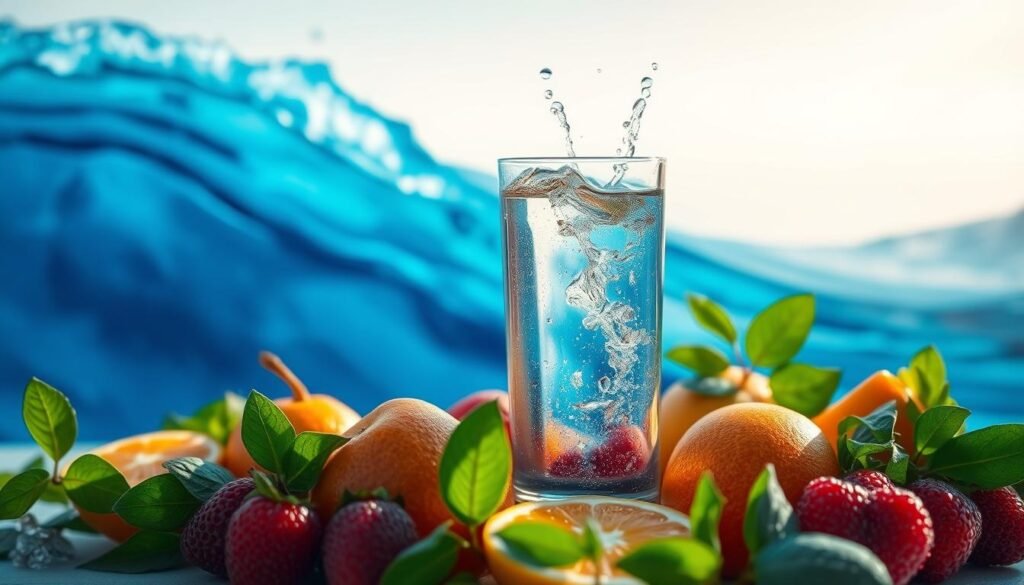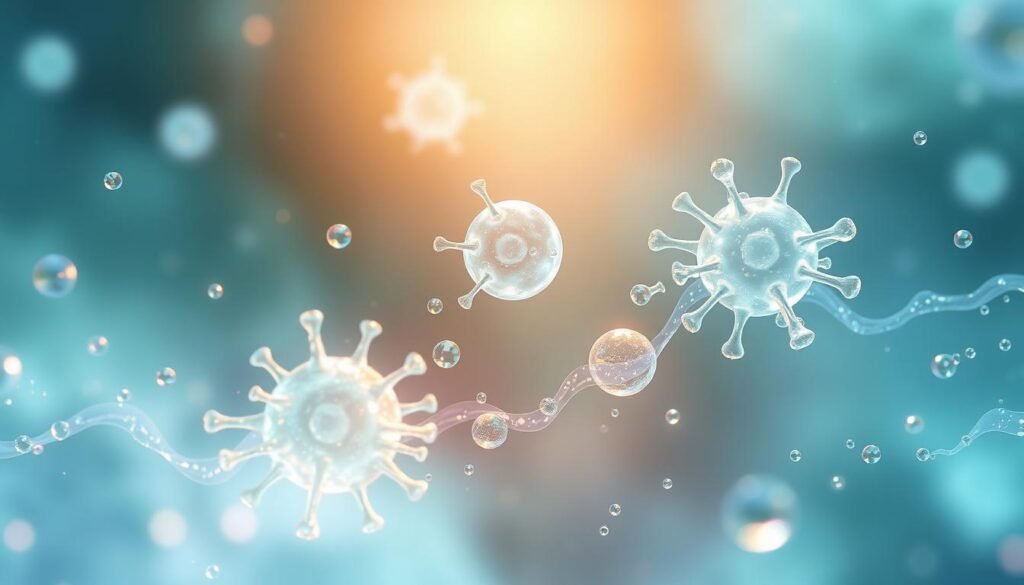Did you know water makes up about 30% of our bodies? This makes it super important for skin health. Surprisingly, staying hydrated doesn’t just help our bodies work better. It also makes our skin look nicer.
A lot of people don’t connect hydration with clearing up acne. But drinking more water helps a lot. Studies show that being hydrated keeps your skin elastic and toned. If your skin is dry, it can make more oil. That can lead to acne.
By drinking enough water, we can keep our skin healthy and nice-looking. It’s a simple but powerful way to improve our skin. Knowing how hydration and acne are linked can help us take care of our skin better.
Key Takeaways
- Hydration is crucial for overall skin health.
- Drinking water can lead to clearer skin by reducing acne breakouts.
- Dry skin can trigger overproduction of sebum, worsening acne.
- Well-hydrated skin appears more elastic and toned.
- Adequate water intake is a simple strategy for better skin appearance.
- Understanding hydration’s role can empower individuals in managing their skin health.
The Importance of Hydration for Skin Health
Staying well-hydrated is key for keeping your skin healthy. Water is crucial for skin processes. It brings nutrients to skin cells and supports their functions. A hydrated body leads to skin that looks smooth and even.
Understanding the Role of Water in Skin Function
Water is necessary for skin in many ways. It keeps skin flexible and resilient. This flexibility helps skin recover from daily wear and tear. With enough water, our skin’s barrier works better at keeping out harmful elements and keeping in moisture.
The Connection Between Hydration and Skin Appearance
How your skin looks is greatly affected by hydration. Skin that’s hydrated well appears bright and young. Drinking plenty of water boosts blood flow, which helps even out skin tone and reduces fine lines. If you don’t drink enough, your skin may look tired and dry, making any spots or wrinkles stand out more. Knowing how important water is will help people make good choices for their skin and overall looks.
| Hydration Level | Skin Function | Skin Appearance |
|---|---|---|
| Optimal | Enhanced nutrient delivery, improved elasticity | Radiant, youthful, minimal fine lines |
| Moderate | Limited nutrient absorption, reduced flexibility | Dull, slightly dry, visible imperfections |
| Low | Compromised barrier function, increased vulnerability | Very dry, accentuated blemishes, uneven tone |
Hydration and Acne
Understanding how hydration affects acne is key to skin health. Drinking enough water helps reduce acne outbreaks. By flushing out toxins and managing body heat, water keeps skin working well.
Exploring the Link Between Water Intake and Acne
Many studies show a big acne link with how much water you drink. People who drink plenty of water see fewer acne problems. Not drinking enough water can make inflammation worse, leading to more acne.
Staying well-hydrated is essential for healthy skin and a happy skin microbiome. This balance helps prevent acne problems. Clearly, keeping hydrated is crucial for managing acne well.
How Water Intake Influences Sebum Production
It’s key to understand how sebum production works to keep skin healthy. Drinking enough water plays a big role in this. Getting enough water helps the skin balance its oil, avoiding both dryness and too much oil. This balance is critical for preventing skin problems like acne.
The Relationship Between Hydration and Oil Balance
Hydration directly impacts the skin’s oil balance. With the right amount of water, the body makes the perfect amount of sebum. This oil helps lock in moisture, keeping skin smooth. Not drinking enough water can throw off this balance. This often leads to more oil as the skin tries to make up for the dryness.
Effects of Dehydration on Sebum Levels
Lack of water can cause the skin to make too much oil. This might block pores and cause pimples. But drinking enough water can help you avoid these issues. Studies show good hydration helps skin health, making it strong. Drinking plenty of water helps avoid acne problems. For more information on how water affects skin health, check this source.
| Condition | Water Intake | Sebum Production | Skin Condition |
|---|---|---|---|
| Hydrated | Adequate | Normal | Healthy |
| Dehydrated | Low | Increased | Oily/Acne-prone |
Leveraging Anti-Inflammatory Benefits of Hydration
Keeping your body well-hydrated is crucial, especially for those with acne-prone skin. It helps fight inflammation, which often worsens acne. Drinking enough water is a simple yet effective way to support your skin’s health.
Why Inflammation Matters for Acne Prone Skin
Inflammation plays a big role in causing and worsening acne. It can irritate the skin and lead to clogged pores. Drinking plenty of water reduces this inflammation. This helps keep acne under control.
When your skin stays hydrated, it’s better at healing after breakouts. This reduces redness and swelling related to inflammation.

| Aspect | Effect of Hydration |
|---|---|
| Inflammation Reduction | Minimizes systemic inflammation, aiding acne control |
| Skin Healing | Promotes faster recovery from breakouts, reducing redness |
| Skin Irritation | Lessens irritation due to better moisture retention |
| Clogged Pores | Hydrated skin stays healthier, decreasing clogging |
Adding enough hydration to your daily routine can make a big difference in your skin. For those dealing with acne, it’s crucial. A hydrated body is key for keeping your skin healthy.
The Role of Water in Skin Barrier Function
Water is key for healthy skin. It forms a barrier that protects us from toxins, germs, and drying out. If our skin stays hydrated, it stops harmful stuff from getting in and stops skin problems like acne. But, if we don’t drink enough water, this shield gets weaker. Then, our skin is more open to damage and issues.
How Proper Hydration Supports Skin Defense
Keeping our skin hydrated is a must for it to defend itself well. With enough water, our skin can control oil better. This means we get fewer acne breakouts. Staying hydrated also keeps our skin stretchy and strong. Drinking enough water helps our skin protect itself better.
- Enhances moisture retention: Keeping hydrated ensures our skin holds onto water, critical for a strong barrier.
- Boosts resilience: When our skin has enough water, it’s tougher against outside bad stuff, keeping it clear and healthy.
- Regulates oil production: A healthy skin shield keeps oil levels in check, lowering the chance of acne.
| Hydration Level | Skin Defense Quality | Risks of Compromise |
|---|---|---|
| Optimal | Strong | Low irritant absorption |
| Moderate | Fair | Increased sensitivity |
| Low | Weak | High risk of irritation and acne |
Cellular Renewal and Skin Rejuvenation
Hydration is key for cellular renewal and better skin. If skin gets enough moisture, it helps skin cells renew faster. This leads to the removal of old, dead cells, making way for new, healthy skin. Your skin’s overall look gets better.
The Impact of Hydration on Skin Cell Turnover
Drinking enough water greatly impacts skin cell turnover. It makes skin cells renew quicker, improving skin’s texture and look. Your skin becomes smoother, clearer, and more glowing. It also helps the body get rid of toxins, making the skin stronger and more lively.
How Water Aids in the Healing Process
Water is vital for skin healing. It helps the body heal faster from acne scars and breakouts. When skin cells get enough water, they heal quicker. This reduces skin imperfections, making the skin look healthier and more even over time.

Home Remedies and Tips for Staying Hydrated
Keeping hydrated is key for healthy skin and fighting acne. Using home remedies can boost hydration. Always have a water bottle handy to drink throughout the day. It helps you drink water regularly.
Adding fruits or herbs to water makes it tasty. For example, cucumber or mint can turn water into a refreshing drink. These hydration methods add a fun twist and are good for your skin.
Eating water-rich foods is also important. Watermelon and oranges are full of water, natural sugars, and nutrients. They’re great home remedies for hydration and skin care.
Herbal teas are another good choice. Teas like chamomile or hibiscus can soothe and hydrate your skin. Using reminders on your phone to drink water can help you stay consistent.
| Hydrating Foods | Water Content (%) |
|---|---|
| Watermelon | 92 |
| Cucumber | 95 |
| Strawberries | 91 |
| Oranges | 86 |
| Celery | 95 |
Using these hydration methods with regular water drinking changes how your body stays moist. Being proactive with hydration helps your skin and your overall health.
For more on natural skin health solutions, check out different home remedies for acne focusing on hydration and nutrition.
Lifestyle Factors That Affect Hydration
Knowing how lifestyle affects hydration is key for healthy skin. What you eat matters a lot for skin hydration. Not eating enough water-rich foods can dry out your skin. This could make acne worse. Foods high in sugar and salt can also dehydrate you and make your skin look worse. Eating lots of fruits and vegetables can help keep your skin hydrated. This is good for fighting diet-related acne problems.
Diet and Its Impact on Skin Hydration
What you eat directly affects how hydrated your skin is. Foods like cucumbers, watermelon, and oranges add to your body’s water level. But, eating a lot of processed foods can up your salt intake. This might dry out your skin. Staying hydrated is key. It supports a diet that keeps your skin healthy. Learning about hydration shows why choosing nutrient-rich foods is critical for a clear skin.
The Importance of Regular Hydration Practices
Along with diet, drinking enough water daily is a must. Setting daily water goals can help keep you on track. Tricks like drinking water at set times or always having a water bottle nearby help. These habits meet your body’s needs. They also lower the chance of getting acne from being dehydrated. Pairing these hydration habits with a good diet can really boost your health and clear up your skin, as shown in this study on lifestyle factors and acne.